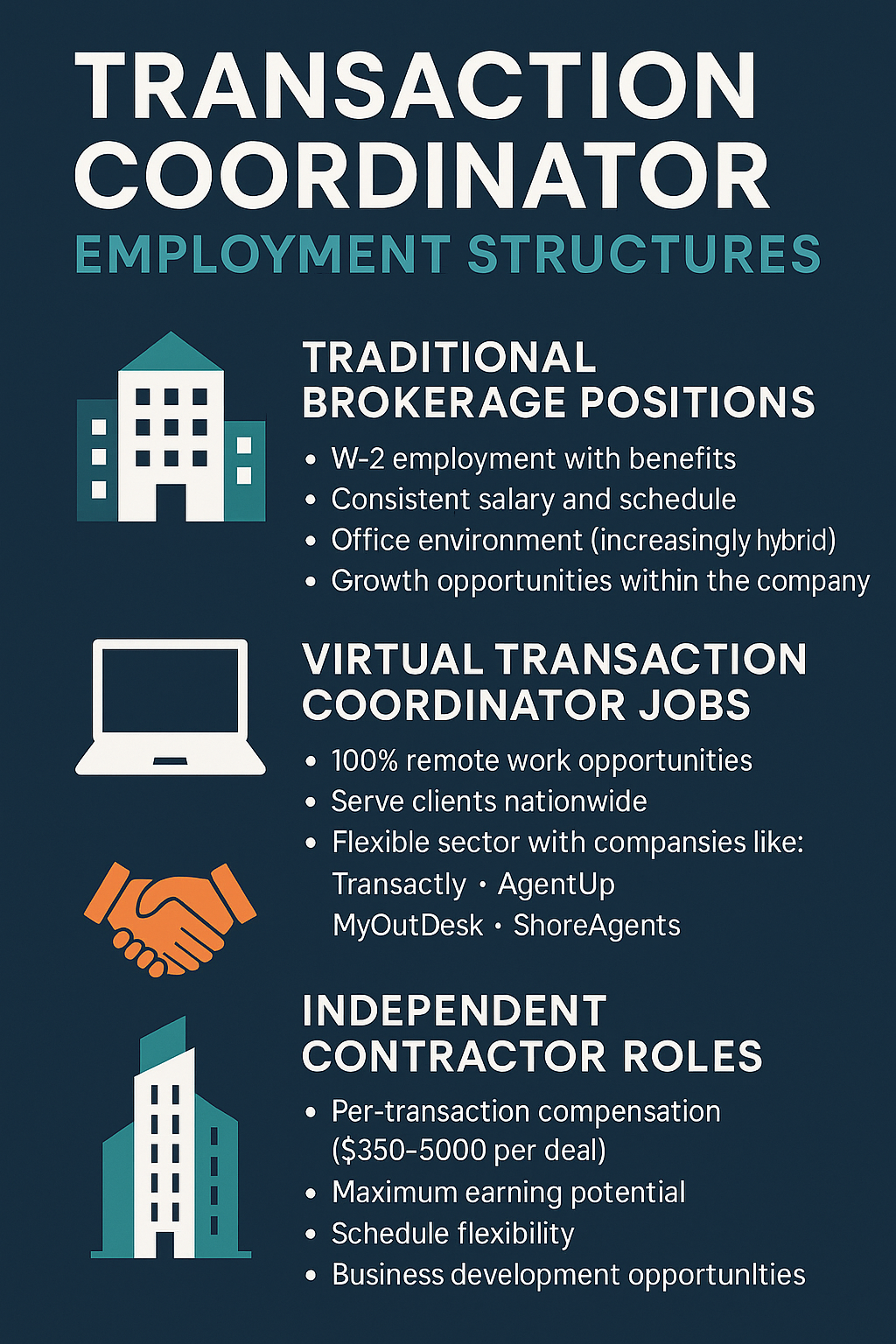Are you searching for transaction coordinator jobs that offer stability, growth potential, and the flexibility to work remotely? The real estate industry’s demand for skilled transaction coordinators has never been higher, with thousands of positions available nationwide and salaries ranging from $40,000 to $81,000+ annually.
This comprehensive guide covers everything you need to know about finding and securing transaction coordinator jobs, from entry-level opportunities to advanced positions with top-tier compensation. Whether you’re just starting your career or looking to transition into real estate, understanding the transaction coordinator role and job market will position you for success in this growing field.
Where Do I Find Transaction Coordinator Jobs?

Transaction coordinator jobs involve managing the administrative and operational aspects of real estate transactions from contract to closing. As a transaction coordinator, you’ll serve as the central point of contact between buyers, sellers, real estate agents, lenders, and title companies.
To fully understand the scope of these positions, it’s helpful to know what is a transaction coordinator and their critical role in the real estate process. Transaction coordinators ensure that every detail is managed properly, from initial contract review to final closing documentation.
Key responsibilities include:
- Reviewing and managing purchase agreements using AI contract review technology
- Coordinating inspections, appraisals, and repairs
- Tracking critical deadlines and contingencies with transaction coordinator checklists
- Communicating with all parties throughout the transaction
- Ensuring compliance with local and state regulations using federal compliance checklists
- Preparing closing documentation and managing TRID compliance timelines
The role has evolved significantly with technology, and modern transaction coordinators leverage transaction coordinator software to streamline processes and improve efficiency. Understanding these tools is essential for anyone seeking transaction coordinator jobs in today’s market.
Current Job Market for Transaction Coordinators

The transaction coordinator job market is experiencing robust growth, driven by increasing real estate activity and agents’ need for operational support. According to recent industry data, 98% of agents who use transaction coordinators report closing more transactions monthly, creating unprecedented demand for skilled professionals.
Understanding why hire a transaction coordinator helps job seekers appreciate the value they bring to real estate teams and the stability this creates in the job market. Real estate professionals recognize that transaction coordinators are essential for scaling their business operations.
Job Availability by Platform
- Indeed: 2,160+ active transaction coordinator positions
- LinkedIn: 478,317+ real estate-related jobs (many TC roles)
- ZipRecruiter: 20,418+ remote transaction coordinator opportunities
- Virtual companies: Hundreds of positions with specialized firms
Geographic Distribution
Transaction coordinator jobs are available nationwide, with the highest concentrations in:
- California (requires CTC certification)
- Texas
- Florida
- New York
- Georgia
The growth in transaction coordinator positions correlates directly with the expansion of real estate team structures, as teams recognize the operational value that skilled coordinators provide.
Salary Expectations for Transaction Coordinator Jobs

Understanding compensation helps you negotiate effectively and target appropriate positions. For detailed salary breakdowns and compensation trends, refer to our comprehensive transaction coordinator salary guide 2025, which provides current market data and negotiation strategies.
Entry-Level Positions ($30,000 – $40,000)
- High school diploma required
- 0–1 years experience
- 5–15 transactions monthly
- Training provided
Mid-Level Positions ($40,000 – $55,000)
- 1–3 years experience
- Software proficiency required
- 15–30 transactions monthly
- Some specialization opportunities
Senior-Level Positions ($55,000 – $90,000+)
- 3+ years experience
- Team leadership responsibilities
- 30+ transactions monthly
- Advanced specializations
Geographic Salary Variations
- New York: $61,307 average
- California: $58,000 – $75,000
- Texas: $45,000 – $60,000
- Tennessee: $36,267 average
Types of Transaction Coordinator Jobs

The field offers diverse employment structures to match different lifestyle preferences:
Traditional Brokerage Positions
- W-2 employment with benefits
- Consistent salary and schedule
- Office environment (increasingly hybrid)
- Growth opportunities within the company
Virtual Transaction Coordinator Jobs
-
100% remote work opportunities
-
Serve clients nationwide
-
Flexible scheduling options
-
Growing sector with companies like:
- Transactly
- AgentUp
- MyOutDesk
- ShoreAgents
Independent Contractor Roles
- Per-transaction compensation ($350–$500 per deal)
- Maximum earning potential
- Schedule flexibility
- Business development opportunities
Understanding how real estate teams split commission can help you negotiate better compensation packages, especially when working as an independent contractor where your fees might be structured as part of the team’s commission split.
Specialized Positions
- Luxury property transactions
- Commercial real estate
- New construction coordination
- Multi-state transaction management
The complexity of these specialized roles often requires familiarity with state real estate disclosure requirements and advanced knowledge of compliance regulations, which can command premium compensation in the job market.
Essential Qualifications for Transaction Coordinator Jobs

Success in transaction coordinator positions requires a combination of technical skills, soft skills, and increasingly, specialized certifications. Understanding these requirements helps you prepare effectively for the competitive job market.
Education and Certification Requirements
- Minimum: High school diploma or equivalent
- California: Certified Transaction Coordinator (CTC) certification required
- Preferred: Real estate license (not always required)
- Beneficial: College degree in business or related field
For comprehensive guidance on certification requirements, check out our detailed guide on how to become a certified transaction coordinator, which covers step-by-step instructions for different states and certification programs.
Additional Training Resources
- Transaction Coordinator Academy – Comprehensive TC training
- VPM Solutions TC Training – Virtual property management training
- Freedom Real Estate Services – Certification guidance
Our top transaction coordinator courses article provides additional education options and reviews of leading training programs in the industry.
Technical Skills
Understanding and proficiency with real estate technology is crucial for modern transaction coordinator jobs. The industry has embraced digital solutions, making technical competency a key differentiator for candidates.
- DocuSign: Industry-standard e-signature platform
- Transaction management software: Dotloop, Paperless Pipeline, SkySlope
- MLS systems: Property data access and management
- Microsoft Office: Advanced Excel and Word proficiency
- Customer relationship management (CRM) systems
For a comprehensive overview of available tools, read our guide on what is transaction coordinator software and explore our comparison of top transaction management real estate software 2025. Modern TCs also benefit from understanding digital transaction management 2.0 concepts and how technology is reshaping the industry. Familiarity with PDF OCR technology is increasingly valuable for document processing efficiency.
Soft Skills
- Exceptional organizational abilities
- Strong written and verbal communication
- Time management and multitasking
- Problem-solving under pressure
- Attention to detail and accuracy
Where to Find Transaction Coordinator Jobs
Major Job Boards
- Indeed – Largest selection with 2,160+ positions
- LinkedIn – Professional networking and job search
- ZipRecruiter – Strong remote job selection
- Glassdoor – Salary insights and company reviews
Specialized Real Estate Job Sites
- SelectLeaders – Executive real estate recruiting
- iHire Real Estate – Real estate industry jobs
- CREW Network – Commercial real estate women’s network
- Real Estate Jobs – Industry-specific job board
Direct Company Applications
National Brokerages:
- Keller Williams Careers
- RE/MAX Careers
- Coldwell Banker Careers
- Century 21 Careers
- eXp Realty Careers
Virtual TC Companies:
Networking Opportunities
- National Association of Realtors (NAR) – Find local associations
- Local REALTOR Associations – Directory of local chapters
- Real Estate Investor Groups – BiggerPockets local meetups
- Real Estate LinkedIn Groups – Professional networking
- ICREA (International Conference of Real Estate Associations) – Global networking
How to Apply for Transaction Coordinator Jobs

Successful application strategies for transaction coordinator positions require understanding what employers value and how to present your qualifications effectively. The application process often differs between traditional brokerages and virtual companies.
Crafting Your Resume
Highlight relevant experience:
- Administrative and organizational roles
- Customer service positions
- Any real estate-related work
- Software and technology proficiency
Key skills to emphasize:
- Transaction management
- Client communication
- Deadline management
- Problem-solving
- Software proficiency
For additional insights into the role’s requirements, consult our transaction coordinator real estate guide and review what specific skills employers prioritize most highly.
Cover Letter Best Practices
- Address specific job requirements
- Demonstrate understanding of real estate transactions
- Highlight organizational and communication skills
- Show enthusiasm for detail-oriented work
- Reference familiarity with industry tools and processes
Understanding how do real estate teams work can help you speak knowledgeably about team dynamics and your potential role within different organizational structures.
Interview Preparation
Successful interviews for transaction coordinator jobs demonstrate both technical knowledge and practical problem-solving abilities. Preparation should include understanding common challenges and having specific examples ready.
Common questions include:
- “How do you stay organized with multiple deadlines?”
- “Describe your experience with transaction software.”
- “How would you handle a difficult client situation?”
- “What’s your process for catching and correcting errors?”
- “How do you prioritize tasks when managing multiple transactions?”
Prepare examples using the STAR method:
- Situation: Context of the challenge
- Task: Your responsibility
- Action: Steps you took
- Result: Positive outcome achieved
Familiarize yourself with transaction coordinator email and SMS templates to demonstrate your understanding of professional communication standards. Also, review the red flag compliance cheat sheet to show your knowledge of critical compliance issues.
Professional Development and Industry Resources

Successful transaction coordinators invest in continuous learning and professional development. The real estate industry evolves rapidly, with new regulations, technologies, and best practices emerging regularly.
Essential Professional Resources
Building expertise in transaction coordination requires staying current with industry standards and accessing quality educational materials. Key resources include:
- Transaction Coordinator Glossary – Master industry terminology
- Best Practices Handbook – Industry standards and procedures
- Federal Document Request Forms – Standardized documentation
- Document Request Forms – Template collection
- Real Estate Glossary – Comprehensive terminology guide
These resources help transaction coordinators stay current with evolving standards and demonstrate professionalism to employers during the job search process.
Technology Proficiency Development
Modern transaction coordinator jobs increasingly require comfort with emerging technologies. Understanding REALTOR software options and staying current with platform comparisons like ZipForm Plus vs Dotloop demonstrates technical sophistication that employers value.
Successful candidates often showcase their knowledge of multiple platforms and their ability to adapt to new systems quickly, which is crucial in a rapidly evolving technological landscape.
Career Growth in Transaction Coordinator Jobs
The transaction coordinator field offers multiple pathways for advancement, with opportunities to specialize, advance within organizations, or transition to related roles. Understanding these progression opportunities helps job seekers make strategic career decisions.
Advancement Opportunities
- Senior Transaction Coordinator – Lead complex transactions
- Team Lead/Manager – Supervise other coordinators
- Operations Manager – Oversee entire transaction department
- Independent Business Owner – Start your own TC company
Lateral Career Moves
- Real Estate Agent – Leverage transaction knowledge
- Escrow Officer – Focus on closing process
- Loan Processor – Specialize in financing coordination
- Compliance Officer – Ensure regulatory adherence
Continuing Education and Certification Maintenance
Professional development in transaction coordination requires ongoing education to maintain certifications and stay current with industry changes. Many states require continuing education for certified coordinators, and the industry continuously evolves with new regulations and technologies.
- Advanced software certifications (DocuSign, transaction management platforms)
- Real estate license acquisition for expanded career options
- Project management training (PMP, Agile methodologies)
- Industry conference attendance (NAR events, state association meetings)
- Specialized compliance training (TRID, fair housing, disclosure requirements)
Our Transaction Coordinator Career Guide provides comprehensive information about career development strategies and advancement pathways in the field.
Industry Trends Affecting Transaction Coordinator Jobs

Understanding current trends helps job seekers position themselves strategically in the market and prepare for future opportunities. The transaction coordination field is experiencing several significant developments that impact job availability and requirements.
Technology Integration
The integration of artificial intelligence and automation in real estate transactions is creating new opportunities while changing traditional job requirements. AI contract review technology is becoming standard in many operations, requiring TCs to understand and leverage these tools effectively.
Regulatory Compliance Focus
Increasing regulatory complexity requires transaction coordinators to maintain current knowledge of compliance requirements. Understanding resources like rate calculators and staying current with federal and state disclosure requirements becomes increasingly important for job security and advancement.
Market Specialization
Many transaction coordinator jobs now focus on specific market segments, requiring specialized knowledge of luxury markets, commercial properties, or specific geographic regions. This specialization often commands higher compensation and provides more stable employment opportunities.
Remote Work Resources
Job Search Platforms for Remote TC Positions:
- Indeed Remote TC Jobs – Filtered remote positions
- LinkedIn Remote Jobs – 2,000+ virtual TC positions
- ZipRecruiter Virtual TC – $40k–$145k salary range
- SimplyHired Remote TC – Virtual coordination opportunities
Remote Work Setup Resources:
- DocuSign – Industry-standard e-signature platform
- Dotloop – Transaction management software
- Paperless Pipeline – Document management system
Benefits of Remote TC Work
- Geographic flexibility – Work from anywhere
- Better work-life balance – Eliminate commute time
- Access to higher-paying markets – Serve clients nationwide
- Cost savings – Reduced transportation and meal expenses
Remote Work Requirements
- Reliable high-speed internet
- Dedicated workspace
- Professional communication setup
- Strong self-discipline and time management
Top Remote Employers
- Virtual transaction coordinator companies
- National brokerages with remote policies
- Independent agents seeking virtual support
- Real estate investment companies
Tips for Landing Transaction Coordinator Jobs
Stand Out from Other Candidates
- Get certified – Complete relevant training programs
- Build a portfolio – Create sample transaction timelines and checklists
- Develop software skills – Practice with DocuSign and transaction platforms
- Network actively – Connect with local real estate professionals
Red Flags to Avoid
- Arriving late to interviews
- Appearing disorganized
- Showing discomfort with technology
- Expressing overwhelm about multitasking
- Criticizing previous employers
Follow-Up Strategy
- Send thank-you emails within 24 hours
- Reference specific conversation points
- Reiterate your qualifications
- Express genuine interest in the position
Frequently Asked Questions About Transaction Coordinator Jobs

Do I need a real estate license?
Most transaction coordinator jobs don’t require a real estate license, though it can be beneficial for advancement. California requires specific CTC certification.
Can I work part-time as a transaction coordinator?
Yes, many positions offer part-time or flexible scheduling, especially with virtual companies and independent contractors.
What’s the difference between in-house and virtual TC jobs?
In-house positions offer traditional employment benefits and office interaction, while virtual roles provide location flexibility and often higher hourly rates.
How quickly can I start working as a transaction coordinator?
With basic qualifications, you can start applying immediately. Entry-level positions typically provide 3–6 months of training to reach full proficiency.
Conclusion: Your Path to Transaction Coordinator Success
Transaction coordinator jobs offer an accessible entry point into the thriving real estate industry with excellent growth potential. Whether you’re seeking traditional office employment, remote flexibility, or entrepreneurial opportunities, the current market provides numerous pathways to success.
The key to landing your ideal transaction coordinator position lies in:
- Developing relevant technical and organizational skills
- Understanding the various employment structures available
- Targeting your job search across multiple platforms
- Preparing thoroughly for interviews with concrete examples
- Staying current with industry technology and trends
With salaries rising and remote opportunities expanding, there’s never been a better time to pursue transaction coordinator jobs. Start building your qualifications today, and take the first step toward a rewarding career managing the operational backbone of real estate transactions.
Ready to begin your search? Start by exploring these key resources:
Job Search Links:
- Indeed TC Jobs – Browse 2,160+ positions
- LinkedIn TC Network – Professional connections
- ZipRecruiter TC Search – Remote opportunities
Training Resources:
- California CTC Certification – Required for CA positions
- Transaction Coordinator Academy – Professional development
DocJacket Resources:
- Transaction Coordinator Software – Learn about essential tools
- Best Practices Handbook – Industry standards
- Career Guide – Comprehensive career development
Consider obtaining relevant certifications and familiarizing yourself with industry-standard software to enhance your candidacy in this competitive but rewarding field. The combination of growing demand, competitive compensation, and flexible work arrangements makes transaction coordinator jobs an excellent career choice for detail-oriented professionals seeking stability in the real estate industry.





